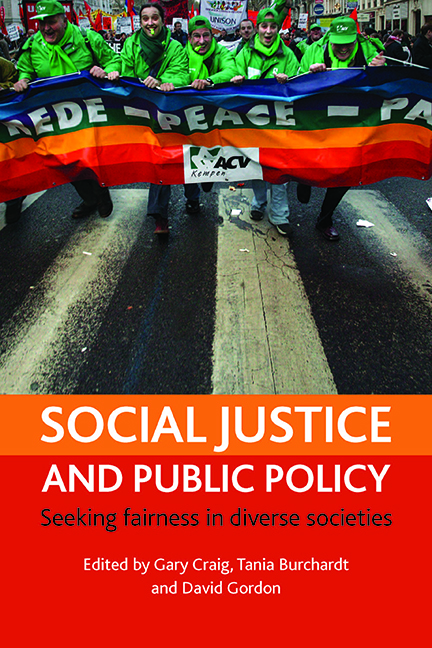Book contents
- Frontmatter
- Dedication
- Contents
- Acknowledgements
- Notes on contributors
- Introduction
- one Social justice and public policy: a view from political philosophy
- two Social justice and public policy: a social policy perspective
- three Multiculturalism, social justice and the welfare state
- four Structural injustice and the politics of difference
- five Recognition and voice: the challenge for social justice
- six Globalisation, social justice and the politics of aid
- seven Social justice and the family
- eight Children, policy and social justice
- nine Social justice in the UK: one route or four?
- ten Monitoring inequality: putting the capability approach to work
- eleven The limits of compromise? Social justice, ‘race’ and multiculturalism
- twelve Understanding environmental justice: making the connection between sustainable development and social justice
four - Structural injustice and the politics of difference
Published online by Cambridge University Press: 19 January 2022
- Frontmatter
- Dedication
- Contents
- Acknowledgements
- Notes on contributors
- Introduction
- one Social justice and public policy: a view from political philosophy
- two Social justice and public policy: a social policy perspective
- three Multiculturalism, social justice and the welfare state
- four Structural injustice and the politics of difference
- five Recognition and voice: the challenge for social justice
- six Globalisation, social justice and the politics of aid
- seven Social justice and the family
- eight Children, policy and social justice
- nine Social justice in the UK: one route or four?
- ten Monitoring inequality: putting the capability approach to work
- eleven The limits of compromise? Social justice, ‘race’ and multiculturalism
- twelve Understanding environmental justice: making the connection between sustainable development and social justice
Summary
Introduction
It is now a truism – which I dispute – that a politics of difference is equivalent to ‘identity politics’, about claims of justice concerning cultural difference. There are at least two versions of a politics of difference: a politics of positional difference and a politics of cultural difference. They share a critical attitude towards a difference-blind approach to policy and politics. They differ, however, in how they understand the constitution of social groups, and in the issues of justice that they emphasise. While both versions of a politics of difference appear in contemporary political debates, over the last two decades the attention of both public discourse and that of political theorists has shifted from the politics of positional difference to a politics of cultural difference. This shift is unfortunate because it tends to obscure important issues of justice, limiting the framing of difference politics to a liberal paradigm. We should affirm both approaches but be clear on the conceptual and practical differences between them.
As a 1980s social movement tendency, the politics of difference involved claims of feminist, anti-racist and gay liberation activists that the structural inequalities of gender, race and sexuality did not fit well with the dominant paradigm of equality and inclusion. In this paradigm, the promotion of justice and equality requires non-discrimination: the application of the same principles of evaluation and distribution to all regardless of their particular social positions or backgrounds. In this ideal, which many understood as the liberal paradigm, social justice means ignoring gender, racial or sexual differences among people. Social movements asserted a politics of difference, theorists arguing that this difference-blind ideal was part of the problem. Identifying equality with equal treatment ignores deep material differences in social position, division of labour, socialised capacities, normalised standards and ways of living that continue to disadvantage members of historically excluded groups. Commitment to substantial equality thus requires attending to such differences.
In the context of ethnic politics and resurgent nationalism, a second version of a politics of difference gained currency in the 1990s, focusing on differences of nationality, ethnicity and religion. It emphasised the value of cultural distinctness to individuals, as against a liberal individualism for which culture is accidental to the self or something adopted voluntarily.
- Type
- Chapter
- Information
- Social Justice and Public PolicySeeking Fairness in Diverse Societies, pp. 77 - 104Publisher: Bristol University PressPrint publication year: 2008
- 2
- Cited by



